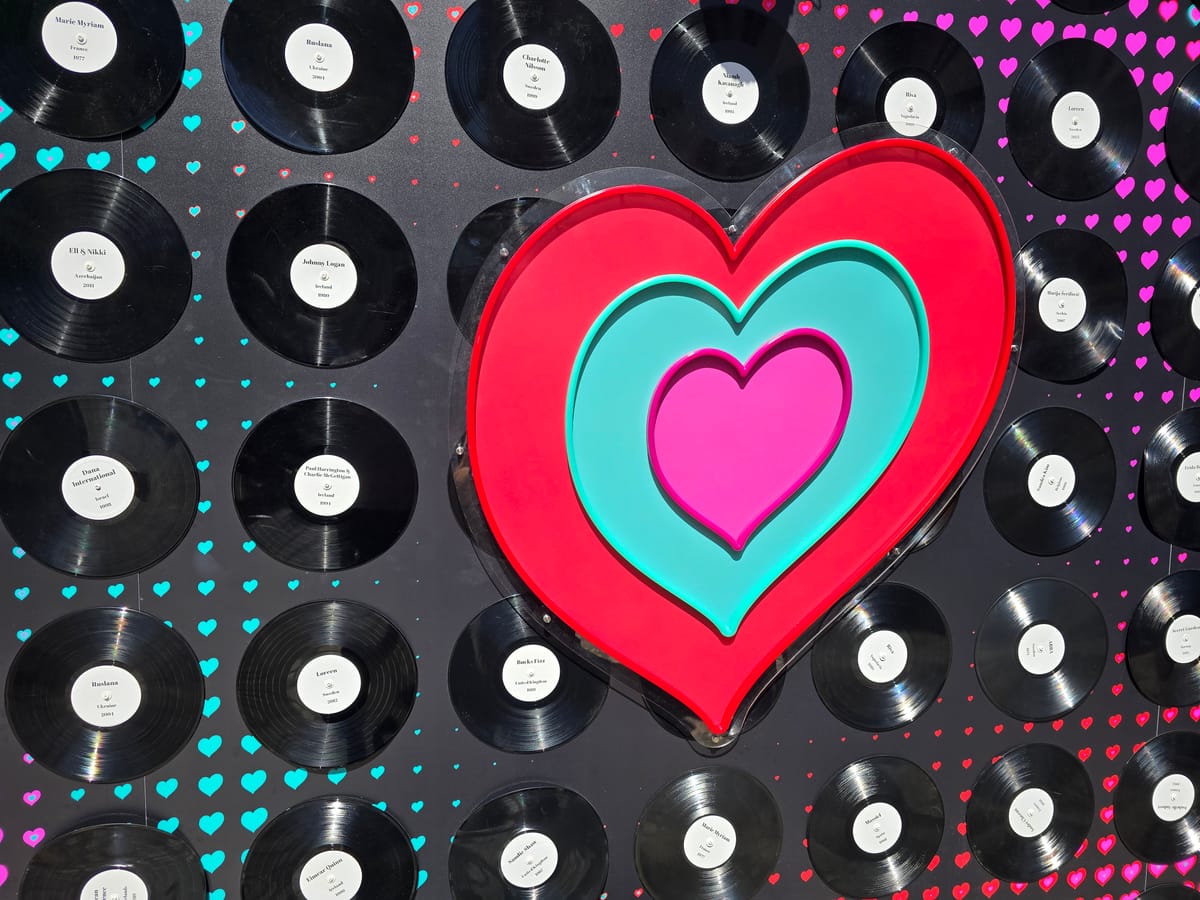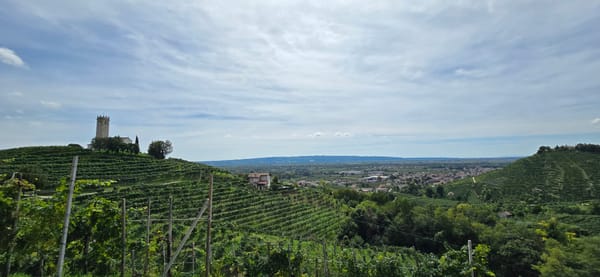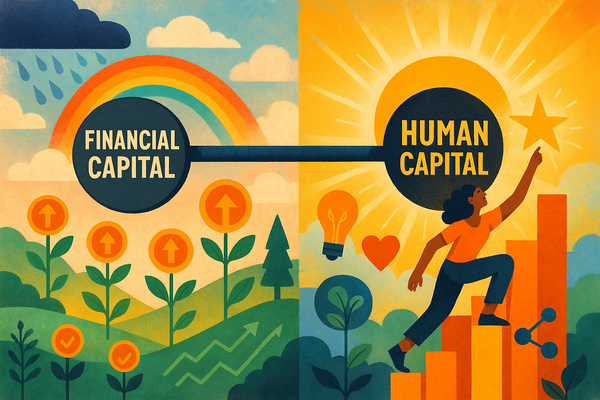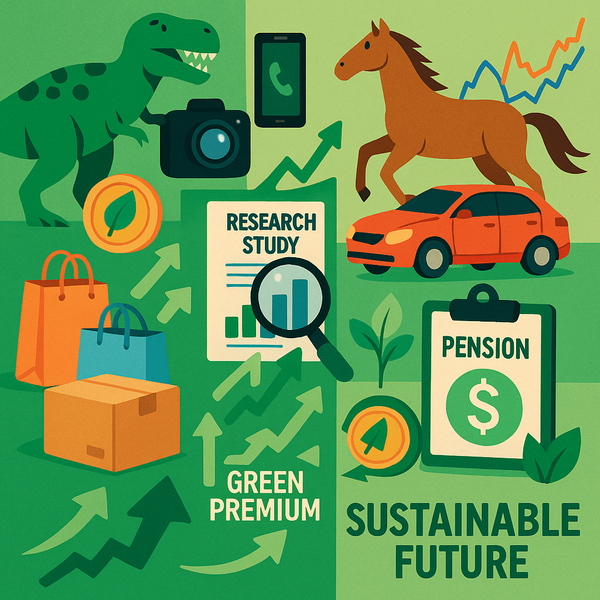Eurovision of Sustainability

Firstly this week, a quick apology. In my recent article about Bitcoin, I shared some incorrect details about Bitcoin ETFs in the UK. To clarify:
- Bitcoin ETFs that directly track the price of Bitcoin are currently only available to professional investors in the UK — not to everyday retail investors.
- Retail investors can access ETFs that track companies linked to Bitcoin, but these do not necessarily always follow the Bitcoin price closely.
- For now, the only way UK retail investors can invest in the Bitcoin price directly is through a cryptocurrency exchange.
However, the UK regulator is reviewing the classification of Bitcoin as a regulated asset. If this progresses, we may see direct Bitcoin ETFs become available to retail investors by 2026 — as they already are in countries like the US and Sweden.
Now to a more positive topic — the Eurovision Song Contest!
I've been an avid fan for years. It has been a long running tradition amongst my social group to have a viewing party each year to watch the event.
Sometimes questionable music, often cheesy, but always entertaining. It is an event that has a special form of positivity, helping bring people together with a spirit of light-hearted fun, humour and togetherness. One of those events that is uniquely uplifting, and a welcome counterbalance to more serious matters in the world today.
It's always been on the bucket list. But this year, I finally made the trip with my husband to Basel. Tickets to the final were like gold dust. So we were amongst the stadium viewing party. But nonetheless the city of Basel put on a week long festival of events, with an incredible atmosphere to the place. It was an apt choice of host, as a city that sits close to the border between 3 European countries — Switzerland, France and Germany. We ended up crossing international borders multiple times throughout the weekend!
It’s also a place we could reach by either flying or taking the train from London. Despite having to get up at 4:30am to catch the cheapest train out, I managed to persuade my husband of the benefits of travelling the slow way! The clincher? .. promise of lunch in Paris, as well as a couple of hours to explore the beautiful City of Lights, on an especially sun-drenched day.
Reflecting on this, it reminded me of an interesting point I read recently. To fix the worlds ills, we need significant societal transformation. Humans are conditioned to take the comfortable route. A lot of human evolution has come from avoiding pain. The challenge with climate change is that, as serious a problem we know it to be, many of us don't yet directly feel the pain. Most of the pain is going to come, not to us, but to future generations. And the future is something most of us find inherently difficult to comprehend. That’s why so many of us under-save into pensions or delay action. By the time most of humanity feels the pain, there'll be too little time for us to avert disaster. That's the crux of the challenge we face.
So what other emotions can drive us? Guilt? As much as we do feel guilt when our behaviours aren't compatible with our goals. It is often ineffective at changing our actions. Despite needing to control our diets after Sri Lanka, guilt didn't stop us from enjoying a full 3-course meal with wine.
Desire? .. so admittedly, that is what persuaded us to overcome the pain of a 4:30am start. The tantalising prospect of lunch in a Parisian restaurant! But as well as emotion, money also ends up being an important factor too. Me offering to buy lunch and the train tickets too, might also have been another persuading factor for my husband.
So back to fixing climate change. It's not just enough that we have the solutions at hand. It is a battle of persuasion. How do we make the solutions so desirable or economically preferable that adopting them is a given? Innovation. This highlights the importance of supporting the entrepreneurs, change-makers and creatives that are coming up with new solutions that not only address a challenge, but also in a way that has the "wow-factor" or is simply a more cost-effective way of doing things.
So in the style of Eurovision, here's a celebration of a few of those creatives from around Europe that have some awe-inspiring, surprising or quirky solution to a fixing a sustainability problem. In ways that make you sit up and say: "Why didn’t we do this sooner? A positive reminder that innovation is actually happening all around the continent. Jury points are also assigned to them without any seeming logic. Enjoy!
Big Vision, Radical Potential

1 point goes to Spain – Multiverse Computing
Quantum computing sounds like science fiction. But Multiverse is using it right now to help energy companies balance renewable grids, financial firms reduce risk, and manufacturers cut waste.
Their algorithms don’t just do what classical computers can — they do what classical computers can’t. That’s a leap for optimisation, with huge implications for energy, logistics, and carbon emissions.
Why it matters: Better data = better decisions. And quantum tech could make systems we rely on vastly more efficient.
Founder insight: "Don’t wait for the future to arrive. Start building it now."

2 points goes to France – Dioxycle
What if we could turn pollution into products? Dioxycle is doing just that — transforming industrial CO2 into ethylene, a vital ingredient in plastics. But unlike the oil-based version, Dioxycle’s ethylene is made using electrolysis and renewable electricity.
Their tech is elegant: plug in to a CO2 source (like a factory), feed it renewable energy, and output green building blocks for industry. It’s modular. Scalable. And already being piloted with major manufacturers.
Why it matters: Chemical production is one of the world’s dirtiest industries. This flips it on its head. Instead of emitting CO2, Dioxycle’s process consumes it. That’s circular chemistry in action.
Founder insight: "We’re turning waste into value. That’s the kind of transformation the future needs."

3 points goes to Poland – Saule Technologies
Imagine solar panels that work indoors. That bend. That print like wallpaper. Saule’s perovskite solar cells are making it happen.
They harvest energy from low light and work on windows, walls, and devices. Their production process is low-cost and low-energy too.
Why it matters: Solar shouldn’t be limited to roofs. This brings renewable power to places we never imagined.
Founder insight: "Innovation is a spark. Our job is to spread the light."
Bold Applications of Nature & Technology

4 points goes to Sweden – PaperShell
Take leftover paper. Press it with a dash of water and bio-based binders. What do you get? PaperShell — a stunningly strong, wood-like material that’s biodegradable and built for use in cars, furniture, and beyond.
This isn’t just a plastic alternative. It’s better. Their panels are tougher than ABS plastic, half the weight of wood, and endlessly customisable. Volvo and Polestar are already on board.
Why it matters: We throw out tonnes of paper waste. This turns it into high-performance materials with a fraction of the carbon footprint.
Founder insight: "The materials of the future must come from the waste of the past."

5 points goes to Estonia – Skeleton Technologies
Supercapacitors sound technical — but think of them like lightning-fast batteries. Skeleton’s curved graphene tech stores energy in bursts, perfect for buses, cranes, and even space rockets.
They charge in seconds, last for decades, and use no rare earths. That’s a game-changer for energy storage.
Why it matters: As we electrify everything, we need fast, clean, durable ways to store power. Skeleton delivers.
Founder insight: "The future needs speed — and staying power."

6 points goes to Finland – Spinnova
Imagine a T-shirt made from wood — with no toxic chemicals, no water waste, and no microplastics. That’s the magic of Spinnova, which spins soft, breathable fibres straight from cellulose.
Unlike synthetic fibres, their material is 100% biodegradable. Unlike cotton, it doesn’t guzzle water. It’s fashion, minus the footprint.
Why it matters: Clothing is one of the world’s most polluting sectors. Spinnova offers a textile revolution that’s clean from source to skin.
Founder insight: "We don’t need to reinvent nature. Just learn how to work with it."
Beautiful Simplicity, Clever Rethinks

7 points goes to Germany – HopfON
HopfON is bringing circular design to the beer industry — but not in the way you’d expect. Founded by students from Munich, they’ve found a surprising use for hops waste: high-performance insulation for buildings.
Their panels are biodegradable, naturally fire-resistant, and provide excellent thermal and acoustic insulation. Perfect for retrofitting old buildings — or designing the green homes of tomorrow.
Why it matters: Germany brews more beer than almost anywhere — and 80% of hops biomass is wasted. HopfON taps into this overlooked resource and transforms it into something of long-term value.
Founder insight: "Local materials. Local production. Global potential."

8 points goes to Netherlands – Fairphone
Fairphone is more than a phone — it’s a manifesto. Modular. Repairable. Ethically sourced. Designed to last for years, not months.
Their phones are built with conflict-free minerals, recycled plastics, and fair labour practices. Batteries pop out. Screens are replaceable. It’s tech that treats people and planet with respect.
Why it matters: Most smartphones are designed for disposability. Fairphone proves we can have great gadgets without the guilt.
Founder insight: "When people say sustainability means sacrifice, we show them this phone."

9 points goes to Lithuania – InSoil
(We're being more generous than Eurovision, giving out extra points)
Soil is our planet’s skin — and InSoil is healing it. They help farmers shift to regenerative practices by offering finance tied to ecological outcomes.
Think of it as climate-focused microfinance. When the soil thrives, so do the farmers — and the planet.
Why it matters: Healthy soil stores carbon, retains water, and supports biodiversity. It’s the foundation for future food.
Founder insight: "Good soil is wealth. We’re helping grow both."
Smart Execution, Scalable Impact

10 points goes to Italy – Greenrail
Train tracks might not seem exciting — until you realise they could help clean up the planet. Greenrail replaces traditional concrete sleepers with recycled rubber and plastic ones that last longer and cost less.
Each kilometre of Greenrail track reuses 35 tonnes of waste. They’re also installing solar panels and sensors for smarter infrastructure.
Why it matters: Rail is a climate hero. Making it greener makes the whole transport system better.
Founder insight: "Sustainability isn’t a niche. It’s the new standard for infrastructure."

11 points goes to Ireland – UrbanVolt
(We're being more generous than Eurovision, giving out extra points)
Energy-as-a-service. That’s the promise from UrbanVolt. They replace a company’s lighting with high-efficiency LEDs — for free — and take their cut from the savings.
It’s a no-brainer for businesses. No upfront costs. Instant carbon cuts. And once the deal ends, the savings are theirs to keep.
Why it matters: Lighting uses up to 40% of a building’s electricity. Cutting that at scale is a quick win for emissions.
Founder insight: "Make sustainability easy, and it becomes inevitable."

12 points goes to Denmark – Too Good To Go
Food waste is a climate killer. Too Good To Go is fighting back — with an app that lets you rescue unsold meals from bakeries, restaurants and supermarkets.
You pay less, they waste less, and good food stays out of the bin. Over 100 million meals saved and counting.
Why it matters: If food waste were a country, it’d be the third biggest emitter. This app turns that around, one bite at a time.
Founder insight: "One small act — like saving a sandwich — can ripple into something far bigger."

Nil Points, But Not Without Purpose: Homegrown Vodka-Based Inspiration
This year — once again — the UK was handed nil points from the Eurovision public vote! 😭 A fate we've become accustomed to. But while the UK may have scored zero on stage, it’s far from a blank slate when it comes to bold, purpose-driven innovation.
Beyond the glitz of the contest, there are equally powerful stories of transformation happening in quieter corners of the country. Stories of people daring to leave traditional paths and forge new ones — toward sustainability, creativity, and impact. One such example? Chris Fraser, who left behind a high-flying career in investment banking to launch Dutch Barn Vodka, a carbon-neutral spirits brand grounded in ethical production and British-grown ingredients.
His story is a beacon for anyone considering a mid-career transition into sustainability, purpose-driven entrepreneurship, or eco-conscious business ventures.
Fraser’s pivot from Citigroup Managing Director to sustainable vodka entrepreneur is more than a personal reinvention — it’s a case study in strategic reinvention. With experience in mining finance and corporate advisory, he didn’t walk away from his skills — he repurposed them. He applied the same analytical rigor and leadership to a radically different mission: disrupting the spirits industry with a premium, low-impact product.
And he did it while staying rooted in what mattered most — his family, his values, and a future-forward vision of business. As a Certified B Corp with a commitment to traceability and transparency, Dutch Barn isn’t just selling drinks — it’s shaping a model for sustainable small business growth in the UK.
His advice to aspiring changemakers? “Act.” Not impulsively, but intentionally — with an understanding of risk, a curiosity for what’s possible, and the courage to step into the unknown.
In a time when career change for climate-conscious professionals is increasingly common, Fraser’s journey reminds us that the most important points aren’t handed out onstage. They’re earned quietly — in the fields, distilleries, and boardrooms where real change is brewed.
For those feeling the stirrings of a similar shift — whether it’s a pivot toward sustainable entrepreneurship, a career aligned with climate action, or simply a desire to do something more meaningful — the path ahead can feel both exhilarating and overwhelming. That’s why structure matters. Inspiration gets you moving, but a plan keeps you going.
The Planet Positive GAME Plan is designed for exactly that — helping purpose-driven individuals map their next steps with clarity and courage. Whether you're in finance, tech, education, or any other field, it offers a guided process to explore future paths, align your skills with emerging climate and sustainability opportunities, and build an actionable, values-led roadmap.
Because changing your path — and contributing to real change — starts with clear, intentional steps. The GAME Plan helps you take them with purpose and direction.
Disclaimer:
The information provided is for general informational purposes only and does not constitute investment, financial, tax, or legal advice. Please be aware that an investment strategy that is appropriate for one person, may not be appropriate to another, including yourself. Past performance is not indicative of future results. In tailoring your own personal investment strategy it is recommended to speak to a qualified professional




